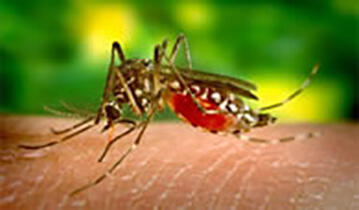
A campaign to stop the sale of electronic mosquito repellents by major airlines is beginning to bear fruit with the immediate withdrawal of the products from KLM flights. The issue being that these electronic repellents, sold to airline passengers, many on their way to malaria endemic countries, just don’t work.
Dr. Bart Knols, editor of the advocacy website MalariaWorld discovered that electronic repellents were being sold by KLM on a recent flight he made. The publicity claimed that the ‘device emits a low frequency sound that is unbearable to mosquitoes’ and Knols, knowing that there is evidence that these sound emitting devices don’t work and could give travellers the false impression that they were protected against mosquitoes and in turn malaria, took action.
Armed with the Cochrane Systematic Review, produced by the Cochrane Infectious Diseases Group and first published in 2007, which clearly demonstrates that electronic repellents do not work, Knols approached KLM with the subsequent positive result that the airline will withdraw these electronic repellents from sale from March 2010 onwards. Knols has since approached British Airways and Singapore Airlines who also sell the electronic repellents and is waiting for a response.
The Cochrane review rigorously examines all relevant, reliable research, and these reviews are recognised as being authoritative, state-of-the-art summaries. “These electronic repellents should not be manufactured, advertised or used to prevent mosquito bites and malaria,” said co-author of the review Professor Paul Garner. Along with Dr. Ali Enayati from the Mazandaran University of Medical Sciences and Professor Hemingway Director of Liverpool School of Tropical Medicine, they carefully analysed 10 studies and found there was absolutely no data to support their use. Professor Garner went on to say “These devices appeal to customers but they simply don’t work. They don’t repel mosquitoes and they don’t prevent people getting bitten.”
To read Bart Knols’ blog on MalariaWorld and follow this story
http://www.malariaworld.org/blog/klm-airline-acts-responsibly
To read the Cochrane review ‘Electronic mosquito repellents for preventing mosquito bites and malaria infection’
http://www.mrw.interscience.wiley.com/cochrane/clsysrev/articles/CD005434/frame.html
-ends-
For further information please contact:
Billy Dean, Development Officer
Office: +44 (0)151 705 3272
Email: william.dean@liv.ac.uk
Notes to Editors
Liverpool School of Tropical Medicine (LSTM)
Liverpool School of Tropical Medicine has been engaged in the fight against infectious, debilitating and disabling diseases for more than a hundred years and continues that tradition today with a research portfolio in excess of £145 million and a teaching programme attracting students from over 70 countries.
Cochrane Infectious Diseases Group
Since 1994, the Cochrane Infectious Diseases Group (CIDG) has been preparing systematic reviews on the benefits and harms of healthcare interventions for infectious diseases, particularly malaria, tuberculosis, diarrhoea, and tropical diseases. The editorial base is located at the Liverpool School of Tropical Medicine in Liverpool, UK and is led by Professor Paul Garner. Over 300 authors from some 40 countries contribute to the preparation of the Cochrane Reviews. They are supported by an international team of Editors, each with topic or methodological expertise. The Cochrane Infectious Diseases Group is funded by the UK Department for International Development (DFID) for the benefit of developing countries. The views expressed are not necessarily those of DFID.
About The Cochrane Library
The Cochrane Library contains high quality health care information, including the Cochrane Database of Systematic Reviews, from the Cochrane Collaboration. Cochrane Systematic Reviews bring together research on the effects of health care and are considered the gold standard for determining the relative effectiveness of different interventions. The Cochrane Collaboration (http://www.cochrane.org) is a UK registered international charity and the world's leading producer of systematic Reviews. It has been demonstrated that Cochrane Systematic Reviews are of comparable or better quality and are updated more often than the reviews published in print journals (Wen J et al; The reporting quality of meta-analyses improves: a random sampling study. Journal of Clinical Epidemiology 2008; 61: 770-775). From 2010 The Cochrane Library will move from quarterly to monthly publication. The Cochrane Library is published by Wiley-Blackwell on behalf of the Cochrane Collaboration.